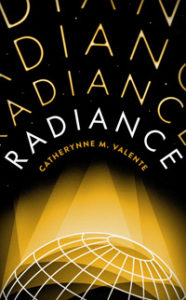Hachette
March 2016
 Headline news 1858: Conrad Wernyhora and Carlotta Xanthea launch a rocket, by cannon, into space. By cannon! Can you imagine anything more majestic, more magnificent, more momentously transcendent, than space travel via cannon? The world of Radiance is not the world we know, bound by practical concepts of physics and fusion, but the fantasy of a world we wish could have been. It takes Georges Méliès’s A Trip to the Moon and asks, “What if?” We step back in time, mid-1800s, when the technology of modernity started to bloom. A few tweaks, a snip here, a mod there, and we step forward again.
Headline news 1858: Conrad Wernyhora and Carlotta Xanthea launch a rocket, by cannon, into space. By cannon! Can you imagine anything more majestic, more magnificent, more momentously transcendent, than space travel via cannon? The world of Radiance is not the world we know, bound by practical concepts of physics and fusion, but the fantasy of a world we wish could have been. It takes Georges Méliès’s A Trip to the Moon and asks, “What if?” We step back in time, mid-1800s, when the technology of modernity started to bloom. A few tweaks, a snip here, a mod there, and we step forward again.
Behold, the moving image!, but now Hollywood has colonised the moon, and the planets and remaining satellites wave the national flags of pre-WW1 powers. An enforcement of patent law means that colour film and sound have never caught on, and a vaudevillian aesthetic permeates the cultural form. To say that Radiance is set in a sumptuous, theatrical solar system of luscious impossibilities is to put it lightly.
The story’s heroine, Severin, is a shadow, an echo, whose presence touches every sentence, every word, but who is nevertheless a construct rather than a person. She is the famous daughter of the famous director, Percival Unck, and her entire life is a story. Even when she speaks for herself, for she rejects the gothic mode of her father to favour documentary realism, her words are scripted, controlled, a story within the veil of truth and transparency. Her life, and her disappearance from Venus, is pieced together in a jumble of disjointed time and stylistic guises. Her existence is defined by the gaze of others, and the artifice of film, and perhaps, only once, do we see the phantom of an inner self, of the woman who went in search of a mystery and became one herself.
Radiance is a beautifully unraveling mediation on the blurred line between life and story. If we assume that a life is the accumulation of memory, what does it mean that memory, much like film, or even the written word, is a construction of edits and distorted perspective for the sake of momentum? Perhaps even the reality of our own senses can’t be trusted. And yet, our senses can delight us, as seen by the world building of Valente’s solar system unfurling in tender, subtlety detailed layers. If truth is an illusion, then perhaps we can at least drink deeply of the wondrous trickery presented at our feet.


Thank you! I’d heard about this book, and your evocative review has put it onto my to-read list!